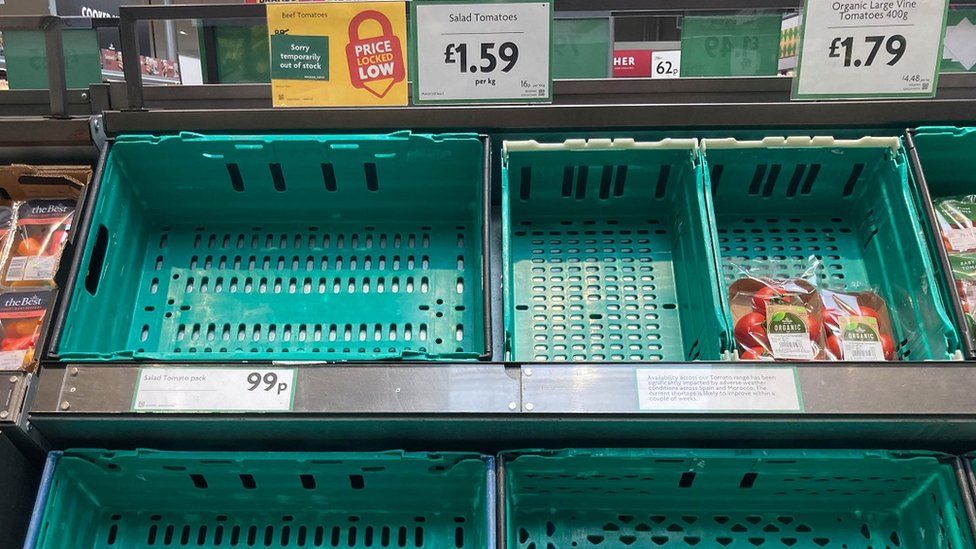ARTICLE AD BOX
 Image source, SWNS
Image source, SWNS
By Theo Leggett
Business correspondent, BBC News
Shortages of some fruit and vegetables, including tomatoes, are likely to persist for several weeks, according to industry sources.
Pictures of empty supermarket shelves have been circulating on social media in recent days.
The British Retail Consortium (BRC) blamed "difficult weather conditions", which have caused poor harvests in southern Europe and North Africa.
High energy prices have also affected production.
Extreme weather has been causing problems in the supply of some crops for months.
The European heatwave last year had a significant impact on the supply of onions, for example, which are usually grown in summer and put into storage. Prices have risen dramatically as a result.
More recently, the supply of crops such as tomatoes, peppers and cucumbers has been affected by unusually cold weather in southern Spain.
At this time of year, a significant proportion of what the UK consumes usually comes from that region.
The usual fallback would be to buy more produce from Morocco, but output there has been affected by flooding, while storms have led to ferries being delayed or cancelled.
Another key source of fresh produce is the Netherlands, where fruit and vegetables are grown in heated greenhouses. But the high cost of energy has led growers to delay planting crops, worsening the overall situation.
Farmers in the UK are facing similar problems.
"There's been a myriad of individual factors" explains Nigel Jenney, chief executive of the Fresh Produce Consortium, which represents around 700 businesses. "Weather, fuel costs, packaging and distribution costs, energy costs."
The extreme weather patterns in Spain and Morocco, he says, have been highly disruptive. But he says the industry is doing all it can to provide the best produce available.
Andrew Opie, director of Food and Sustainability at the British Retail Consortium said the disruption was expected to last for "a few weeks".
Supermarkets are "adept at managing supply chain issues and are working with farmers to ensure that customers are able to access a wide range of fresh produce," he added.
However, other businesses have also been affected.
The Heritage Fine Food Company in Wiltshire, a wholesaler which supplies restaurants, cafes and schools in the south west of England, said sourcing tomatoes had become "incredibly challenging".
Cucumbers are "incredibly limited in supply", while peppers have been failing to ripen, the firm said.
According to managing director Ken Mortimer, many UK businesses have contracts to buy fixed quantities of imported produce. But when they need more, they have to buy it on the open market and prices have been prohibitively high.
Anecdotal evidence suggests the UK has been bearing the brunt of the shortages, with little sign of empty shelves in other European countries.
However, very high prices appear to be a widespread problem across the continent.
Industry sources suggest the UK may be suffering because of lower domestic production and more complex supply chains, as well as a price-sensitive market. But Brexit is unlikely to be a factor, they say.
The main impact of new border procedures for fruit and vegetable imports will not be felt until January - while imports from Morocco, which is outside the EU, are already subject to border checks.
"It's not Brexit", says Mr Mortimer "Or at least, I don't think so".
The BBC has also contacted business body, the Irish Business and Employers Confederation (IBEC) for a response.

 1 year ago
40
1 year ago
40








 English (US) ·
English (US) ·